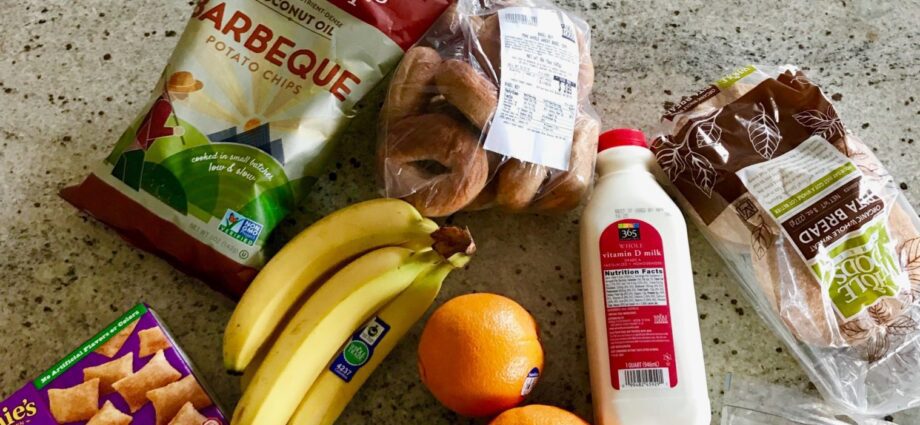Contents
During pregnancy, you constantly want to eat: what to do
Many expectant mothers begin to monitor weight gain almost from the first day of their new position. This is reasonable, because it is not so much about beauty as about health. But what about those who cannot curb their brutal appetite?
In order not to gain more than the norm (200-500 grams per week), it is important to know the basic principles of nutrition while waiting for the baby. On the one hand, it must be balanced for the development of the fetus, and on the other, it must be well-chosen taking into account the physiological changes that occur during this period. The ultimate goal in both cases is health preservation.
In the first half of pregnancy food, as a rule, does not differ from the usual option. At the same time, sweets and light carbohydrates (sweets, cakes, soda, puff pastry and shortcrust pastry) should be excluded, after which the body, as a rule, asks for supplements.
In the second half of the term you need to take a more balanced approach to the issue of food intake and choice of products. Weight without our “help” increases due to the growth of the fetus, the development of the placenta, mammary glands, an increase in the volume of circulating blood, fat is actively accumulating for further lactation. So is it worth eating for two, as mothers and grandmothers advise, or is there nothing wrong with a slight feeling of hunger?
An increased appetite can also occur against the background of an excess of insulin, therefore it is extremely important to exclude gestational diabetes mellitus in a woman. If all is well, then it is advisable to include products with long-term saturation in the menu: meat or poultry with vegetables (preferably stewed), bran bread. And do not follow the lead of older relatives, do not eat for two, increasing portions! The calorie content of the diet after the twentieth week increases by an average of 300 kcal and is 2500-2600 kcal.
Don’t forget about fatty fish: mackerel, herring, sardine. In addition to protein, it contains vitamins A and D iodine, omega-3 polyunsaturated fatty acids, which normalize cholesterol metabolism and strengthen immunity.
Dairy products – a source of protein and calcium.
Leafy greens (parsley, dill, lettuce, etc.) is rich in folic acid, vitamin C and other biologically active substances. Helps improve digestion.
Kashi (oatmeal, buckwheat, pearl barley, wheat, etc.) – a storehouse of B vitamins, minerals, fiber. Oatmeal perfectly normalizes intestinal motility and microflora.
Potatoes (potassium, vitamin C) improves the function of the gastrointestinal tract. But, in order not to gain too much, you need to use it boiled in pieces or baked cooled down – this way the assimilation of starch slows down.
Vegetables not only provide the body with the necessary vitamins and minerals, but also improve the function of the gastrointestinal tract. Carrots, cucumber, celery, beets, pumpkin have a laxative effect.
To facilitate the task, we offer a healthy diet option – with it, excess weight will definitely not threaten you.
Menu for the day
Breakfast
1. Bran or cereal bread – 2 slices (60 g), butter (5 g), oatmeal (150 g), boiled meat (70 g), green vegetable salad: cucumber, bell pepper, lettuce, pumpkin seeds , lemon juice and olive oil (100 g).
2. Millet porridge with pumpkin on water (150 g), baked poultry (100 g), cheese (15 g), tomato (50 g).
3. Salad of baked vegetables with olive oil (200 g), boiled pike perch (120 g) with herbs, two slices of bran bread.
Any two fruits and three nuts will help to wait for dinner.
Dinner
1. Vegetable soup with buckwheat (100 g), boiled potatoes with herbs (100 g), beef cutlet (100 g), salad: cabbage, carrots, green peas, olive oil (100 g).
2. Soup on the second meat broth with vegetables, bulgur (100 g), baked chicken chop, boiled beetroot salad with sour cream.
3. Borscht (100 g), buckwheat (100 g), rabbit stewed in sour cream, carrot salad with cucumber.
For an afternoon snack, we drink any fermented milk drink (fermented baked milk, yogurt) or eat a vegetable salad.
Dinner
1. Cottage cheese casserole (150 g), kefir (250 g).
2. Omelet with broccoli and / or cauliflower, a slice of bran or grain bread.
3. Vegetable casserole (zucchini, carrots, cabbage) with sour cream.
Mom Tips
We have collected recommendations that are shared on the “mommy” forums by those who have managed to avoid significant weight gain.
“No sweets, flour, potatoes, sugar, unnatural juices.”
“I eat a lot of fruits, vegetables, dairy products.”
“Every morning I start with green tea without sugar and cottage cheese with honey.”
“I eliminated everything fried, fatty, replaced bread with bread, eat 5-7 times a day in small portions.”
“I run from the refrigerator in the evenings. I drink a lot of water, eat fruit. “
“For a snack during the day: carrots, dried apricots, prunes, tangerines, apple.”
“For breakfast – oatmeal on water or kefir.”
“Occasionally I can afford a treat, but without fanaticism. I ate and forgot. “










